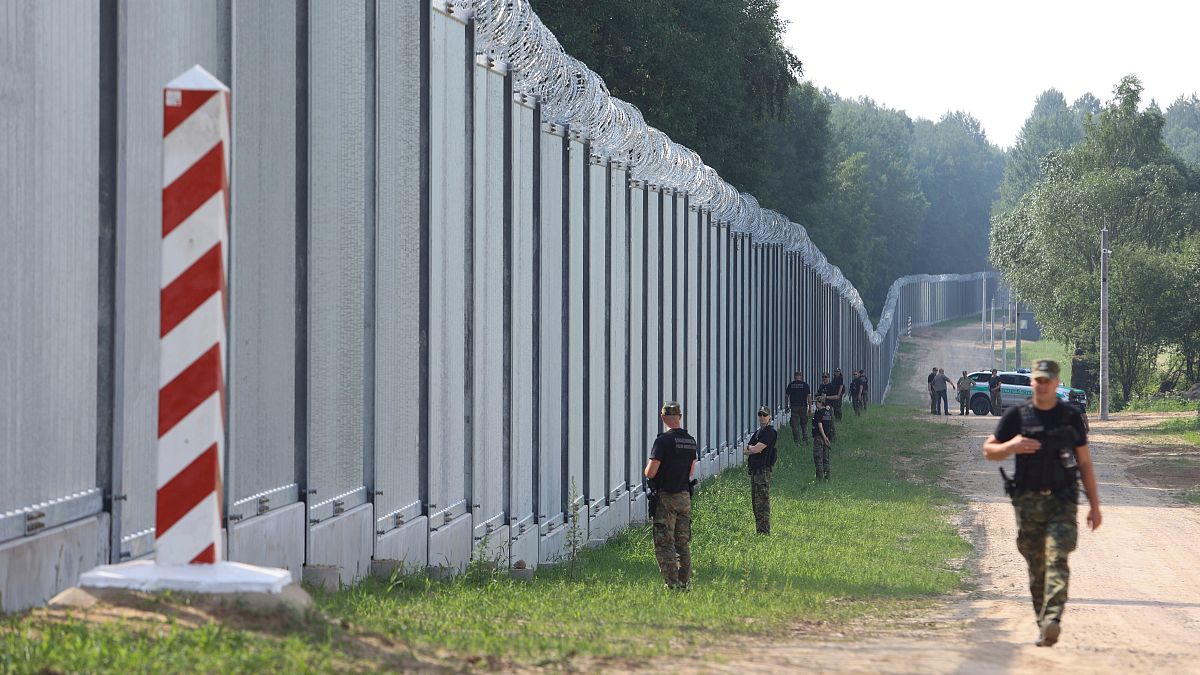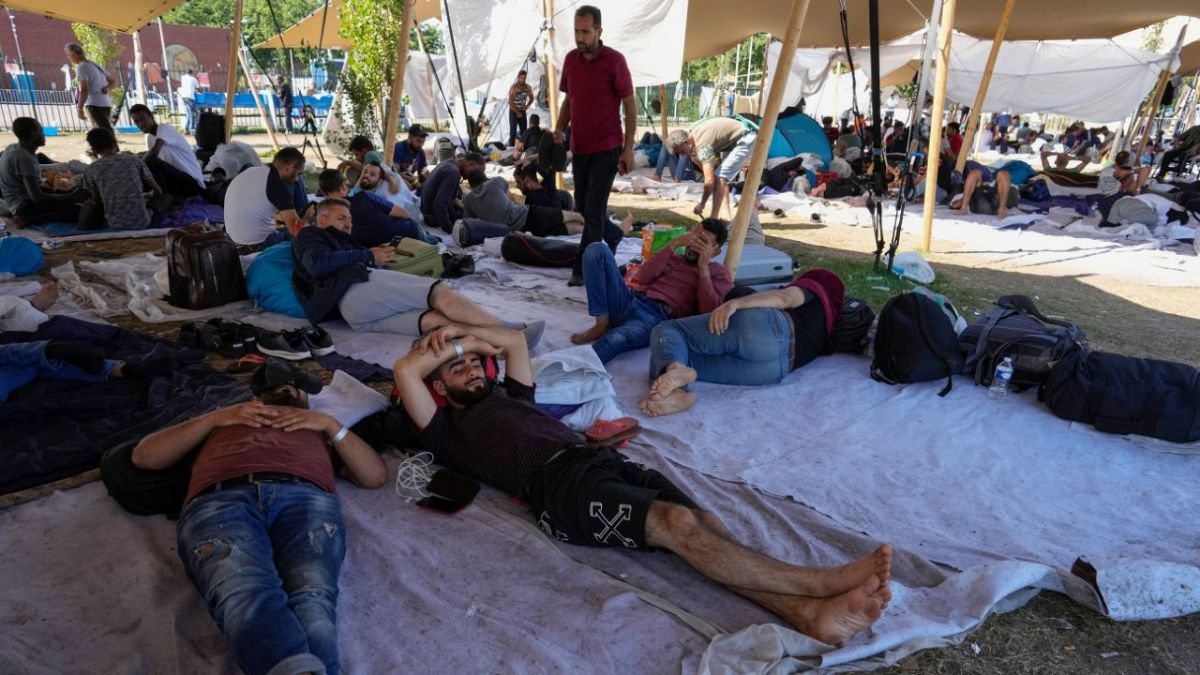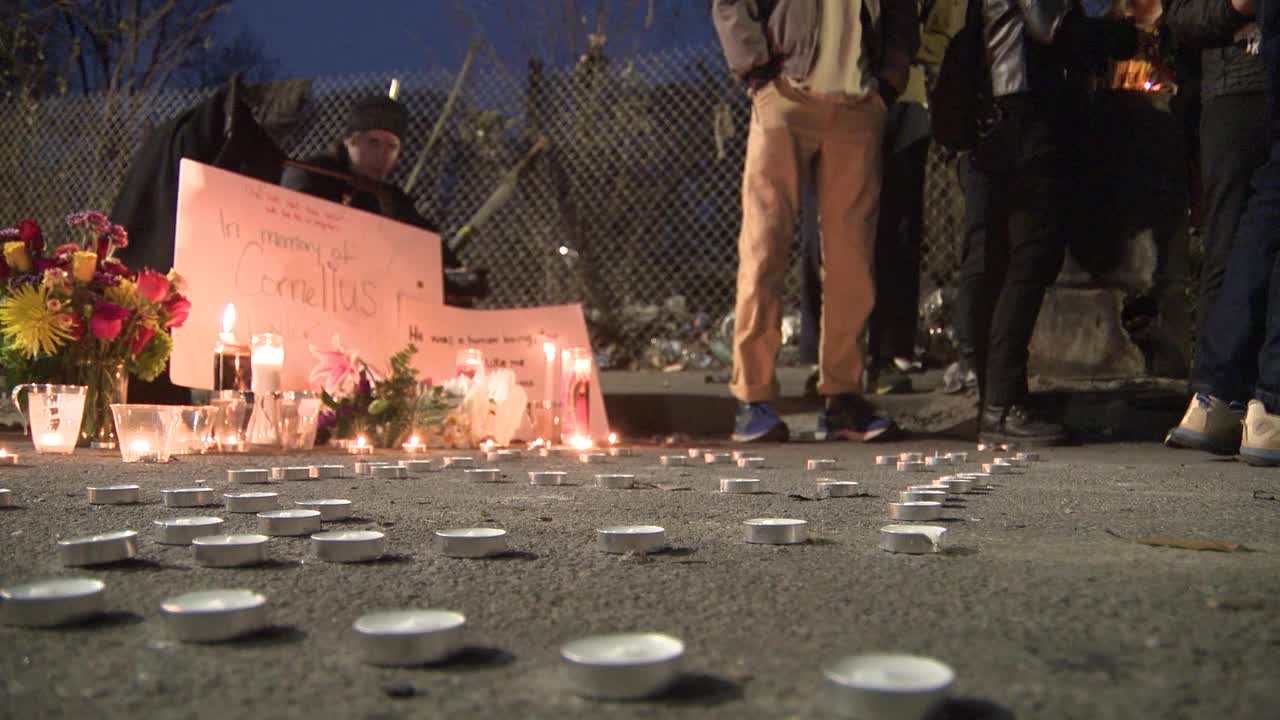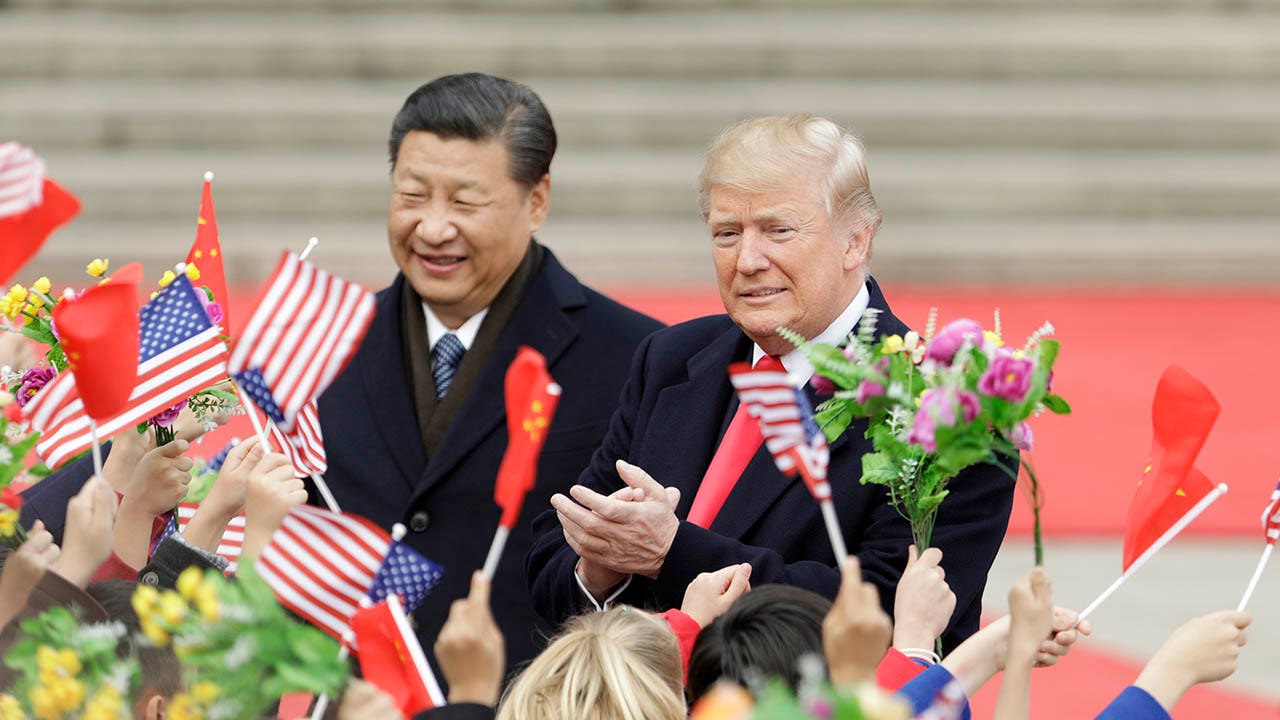World
Asylum seekers alleging torture in Latvia take their claims to court
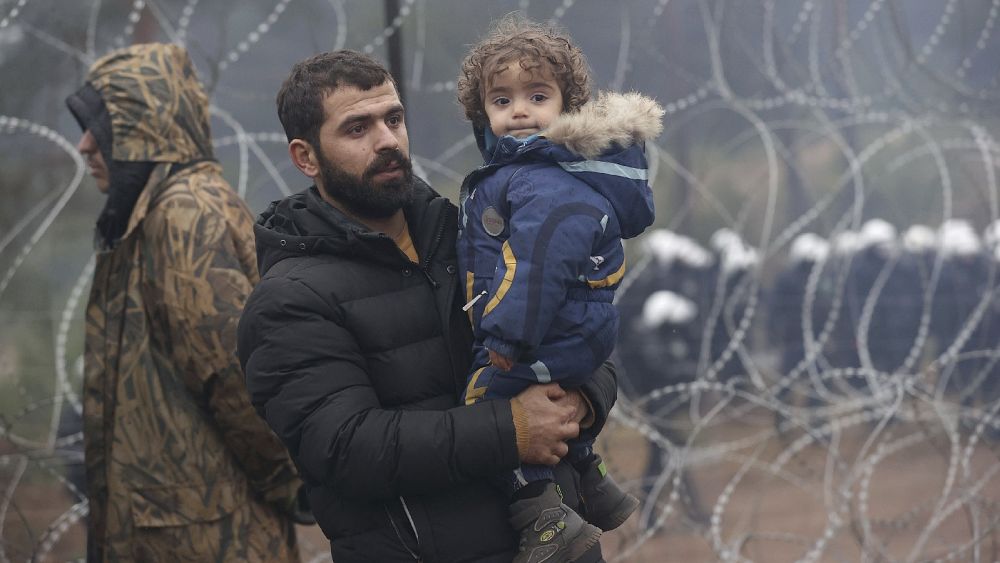
Some of the people looking to take the Latvian state to court have alleged ill-treatment including beatings, electric shocks and cigarette burns.
Earlier this year, Sidya Sompare, 20, a Guinean man who had attempted to claim asylum in Latvia, tried to end his life in a Latvian detention centre by drinking shampoo in his toilet stall.
Having fled Guinea in the wake of threats against his safety due to his participation in anti-government protests, Sompare arrived in Belarus in September 2021 on a quest to find a secure life in Europe, before spending six months in the forested border zone between the country and Latvia.
There, in addition to being pushed back and forth across the border by authorities in both countries, he alleges he was severely beaten, verbally abused, and given barely any food for days on end by Latvian border guards. Sompare then spent eight months in the closed detention center after he lost his passport in the woods and his asylum efforts were denied.
When Sompare was found on the floor of his toilet stall after his suicide attempt, detention center authorities promptly took him to a hospital.
“I’m not sick, I’m alright,” he recalled saying to a doctor during an interview with Euronews. “Just I need to be free.”
He was finally released from detention in April with the help of Doctors Without Borders, an NGO, and a local Latvian human rights group. But Sompare didn’t stop there — having previously filed two unsuccessful complaints against the Latvian state last year for his detention and the dehumanizing treatment he experienced in the forest along the border, he has taken his fight to the European Court of Human Rights (ECHR), where his case was formally registered on July 5.
Beatings and electric shocks
Sompare is not alone in turning to legal pathways to seek justice for ill-treatment by Latvian border authorities during the migrant crisis along the Belarusian border.
As allegations of torture and ill-treatment by Latvian authorities have continued to emerge since last year, an increasing number of migrants and refugees who say they have experienced life-altering trauma at the hands of Latvian security forces have been mounting court challenges against them over the last few months, aiming to hold their former tormentors and the Latvian state accountable.
These cases, which are mostly taking place at the national level with the exception of Sompare’s, represent some of the first legal efforts in Latvia since the start of the border crisis in 2021 that are specifically focused on the harrowing abuse that border authorities have allegedly inflicted on people crossing the border.
“All the Latvian institutions, even the ombudsperson of Latvia, they deny that Latvia did anything illegal with those migrants,” said Nikita Matyushchenkov, a human rights lawyer at Respect, Protect, Fulfill (RPF), the legal organisation that helped Sompare file his ECHR case. “So these will be very important judgements.”
In addition to challenging ongoing deportation procedures against him, Sompare’s ECHR case is focused on the ill-treatment he received in Latvian custody in the forests of the border area, which he and RPF claim was illegal. RPF has also filed three cases at the national level in Latvia, two in March and one in June of this year, on behalf of individuals who claim they were abused by Latvian border authorities between August 2021 and March 2022.
But these may not be the only cases that will be brought to bear against the Latvian state — Matyushchenkov said that RPF has identified up to 100 people who were abused in one way or another by Latvian border guards while in the forest in the border area.
Some of Matyushchenkov’s clients have told him that they were beaten with electric shock devices — claims that are consistent with findings documented in 2022 in an Amnesty International report on Latvia’s border. In another report published this month, the European Committee for the Prevention of Torture and Inhuman or Degrading Treatment or Punishment stated that it had received several claims of “severe ill-treatment” from people who were detained after crossing into Latvia, again recounting beatings and electric shocks to areas of the body “including the genitals.”
‘I got sick physically and mentally’
The ongoing migrant border crisis has, according to European states, been manufactured by Belarusian leader Alexander Lukashenko, whose government has incentivised people from the Middle East, Africa, and South Asia to journey to Belarus before forcing them to cross the borders of Poland, Lithuania, and Latvia illegally as a means of putting pressure on the European Union.
After establishing a state of emergency along its border in August 2021, Latvia adopted new amendments to its border laws in June of this year that have been denounced by Amnesty International, the Council of Europe Commissioner for Human Rights, and the UNHCR as legalising internationally-condemned pushbacks. Crucially, these amendments have also enshrined into law the State Border Guard’s broadly defined use of force to prevent illegal entry into Latvia.
Although Poland and Lithuania have both faced accusations of ill-treatment of migrants as well, Matyushchenkov said that Latvia has been much more extreme in its abuse of people crossing its border.
In one particularly gruesome case that has previously been reported in international media, Abdulrahman Kiwan, a humanitarian worker who fled Syria following pressure from the government of Bashar al-Assad, has alleged that he not only received electric shocks from Latvian guards, but that they extinguished cigarettes in the places where he had previously been injured.
Now, Kiwan said he is in touch with a Latvian human rights group about filing his own complaint against the Latvian state — and if it fails, he is also ready to escalate his efforts to the ECHR with the help of legal NGOs.
“I got sick physically and mentally because of them,” Kiwan, 28, who is now based in Germany, said of the Latvian border authorities. “I want my voice to reach the world and other migrants, that the Latvian Border Guards are liars and are extremely racist.”
A Latvian human rights group is currently working on preparing a complaint for another refugee based in Germany, Hadi, 26, from Yemen, who told Euronews that Latvian guards beat him, violently struck him in the head, and shocked him with an electric baton. In addition to seeking compensation for crimes committed against him, Hadi, who requested to use an alias due to his ongoing asylum case in Germany, also wants his experience to be a cautionary tale.
“Legally, I want this complaint [to ensure] that no human being will be harmed after me,” he told Euronews.
‘The government is scared of me’
Although Matyushchenkov said the chances of success for migrant cases like these at the ECHR may be significant, the same cannot be said for complaints within the Latvian system.
“From the way it was investigated at the national level, it seems like the authorities are not willing to investigate such complaints properly,” he said, referencing Sompare’s initial complaint procedure. “In the response to his complaint, they identified a person who allegedly beat the complainant, and they interviewed that person. That security official said he didn’t beat this person, and this was basically the end of the investigation.”
The Latvian government, including the Latvian State Border Guard, have previously denied any claims of abuse and torture from migrants. As of the writing of this article however, the Latvian State Border Guard, together with the country’s Internal Security Bureau and Prosecution Office which handle legal complaints from people crossing the border, were unavailable for comment.
Sompare, who is currently living in Latvia’s capital Riga, has no plans to leave Latvia anytime soon. As he fights his still ongoing deportation procedure and the traumatic abuse he suffered in the country, he can feel he is already making an impact.
“Something is going to change in Latvia,” he said. “Right now for sure the government is scared of me.”
Despite being severely disappointed in Europe’s capacity to help desperate people like himself, Sompare said he wants to continue his university studies after he wins his case, and hopes to find work at a human rights organization for refugees in Latvia. Until then however, he understands that he is fighting an uphill battle not only to save himself, but also many other asylum seekers who are in the same situation.
“I want to be an example for the people [to whom] the Latvian government did something illegal,” Sompare said. “The things that I started, I will finish them in Latvia.

World
Trump’s Return Has Unnerved World Leaders. But Not India.

Over the past year, a pair of legal bombshells have put India’s growing relationship with the United States to one of its biggest tests yet.
Just as the two sides were announcing unprecedented expansions in defense and technology ties, U.S. prosecutors accused Indian government agents of plotting to assassinate an American citizen on U.S. soil.
Months later, the Justice Department filed fraud and bribery charges against India’s most prominent business mogul, whose enterprises have soared to dizzying heights on the back of Prime Minister Narendra Modi’s power.
Still, the relationship has held. After decades of mutual suspicion between the two countries, said Eric Garcetti, the departing U.S. ambassador to India, the fact that now nothing seems to derail their ties is proof of their strength.
“I don’t think there is anything out there big enough to threaten the trajectory of the U.S.-India relations,” Mr. Garcetti said on Saturday in an interview at the embassy in New Delhi, two days before President Biden leaves office and Donald J. Trump is sworn in as his successor.
“This is incredibly resilient and almost inevitable,” Mr. Garcetti added. “It’s really the pace and the progress that’s not inevitable, like how quickly we get there.”
The Biden administration’s doubling down on the relationship with India came after nearly two decades of efforts to shed Cold War-era suspicions that had culminated with U.S. sanctions on India’s nuclear program in 1998.
Washington sees great potential in India as a geopolitical counterweight to an increasingly assertive China. Already the world’s largest democracy, India took over from China as the world’s most populous nation in 2023. India’s demographic advantages and growing technological capacity could help diversify global supply chains away from China, a priority of the United States and other major powers.
Now comes Mr. Trump’s second presidency, with its America-first orientation and threats of steep tariffs on trading partners. While leaders of many countries are unnerved, Indian officials insist that they are not among them.
S. Jaishankar, the foreign minister, has said India enjoyed “a positive political relationship with Trump” that it hopes will only deepen. As he attended the opening of a U.S. Consulate on Friday in the tech hub of Bengaluru, also known as Bangalore, Mr. Jaishankar quoted Mr. Modi as saying that the two countries were overcoming “the hesitations of history.”
Mr. Modi has enjoyed a strong rapport with Mr. Trump, an important factor because of the incoming president’s personal approach to international relations. During Mr. Trump’s first term, Mr. Modi hosted him at a grand rally in his home state of Gujarat, as well as at a large gathering in Texas of the Indian diaspora — an increasingly crucial extension of the Indian influence in American politics.
But some analysts cautioned that Mr. Trump’s unpredictability and transactional approach could pose risks for India.
Two issues in particular are bound to test the relationship, and most likely soon. During the campaign, Mr. Trump criticized India as gaining an unfair advantage in trade by maintaining high tariffs. And India could be swept up in the controversy if Mr. Trump follows through on his promise of mass deportations of illegal immigrants.
Indians make up the third-largest group of illegal immigrants in the United States, according to the Pew Research Center. If Mr. Trump sends large numbers of Indians back to their home country, it could be a major embarrassment for Mr. Modi.
Amita Batra, a New Delhi-based economist and trade expert, said that India should see warning signs in Mr. Trump’s threat of higher tariffs even against America’s traditional allies, as well as his stated willingness to unravel deals with countries like Mexico and Canada that his own first administration had put in place.
“You may say we are on great terms with Trump, we have an easy relation with the United States, but how Trump views that at a particular time is a different question altogether,” Dr. Batra said at an event at the Center for Social and Economic Progress in New Delhi. “India has to be very cautiously approaching Trump 2.0.”
During the interview, Mr. Garcetti described the bilateral relationship as “the most compelling, challenging and consequential” for both countries.
A former Democratic mayor of Los Angeles, Mr. Garcetti arrived in New Delhi in April 2023, after the mission had remained without an ambassador for two years. His confirmation process had hit a wall over accusations that he had overlooked complaints of sexual harassment by an aide when he was mayor.
He made up for the time lost with a burst of energy and outreach like that of a politician in campaign mode.
He was everywhere, from cricket grounds to cafeterias to cultural programs. Sporting a leather jacket, he even got behind the piano to open for the jazz legends Herbie Hancock and Dianne Reeves, who had come to perform at the Piano Man Jazz Club in New Delhi.
But by the time Mr. Garcetti tried his hand at dancing to a viral Bollywood tune at a Diwali celebration, relations between the two countries had hit major obstacles.
In India, right-wing trolls had seized on the U.S. allegations of Indian government involvement in a plot to assassinate an American citizen advocating a separatist cause in India. That, along with the U.S. indictment of Gautam Adani, the business mogul, was evidence that the United States was trying to dampen India’s inevitable rise, the nationalist online voices argued.
The Biden administration appeared intent on addressing the assassination episode quietly with New Delhi, demanding accountability without allowing it to become a major diplomatic sore point.
“On Capitol Hill, within the White House, I think with those in the know it was a real moment of reflection and pause,” Mr. Garcetti said of the assassination case. “It didn’t pause the momentum — you know, relations between countries are always multifaceted and simultaneous and not just between governments. But I think it was an immediate gut check.”
Mr. Garcetti said that the Biden administration had been reassured by India’s response. New Delhi had accepted the U.S. demand, he said, “not just for accountability but for systemic reform and guarantees that this will never happen again.”
An Indian government inquiry that concluded last week recommended legal action against an unnamed person with “earlier criminal links.” It said that the action “must be completed expeditiously,” in what analysts saw as an attempt to begin the Trump era with a clean slate.
“If we want to cooperate in other areas that are important to us, intelligence sharing, et cetera, trust is the basis of everything,” Mr. Garcetti said. “But I’ve been pretty blown away with how trust can deepen through a challenge.”
One question hovering over the deepening ties between the two countries is whether India can truly emerge as an alternative to China in global supply chains — something that Mr. Garcetti also wondered.
India has reaped only a small part of the windfall from the moves away from China, with businesses preferring places like Vietnam, Taiwan and Mexico, where it is easier to set up operations and where tariffs are lower.
Mr. Garcetti said India had made dramatic leaps after opening up its economy only in the 1990s, years after China. He picked up his iPhone to illustrate a widely highlighted recent success: About 15 percent of iPhone manufacturing now happens in India, a figure that could continue growing rapidly, he said.
More broadly, though, India still struggles to attract foreign investment, despite improvements in infrastructure and some streamlining of regulations. Manufacturing is not growing quickly enough to bring India the jobs it desperately needs.
“Where India’s leaving a lot of progress and jobs and growth on the table is figuring out a better way to make it seamless and frictionless to invest here for export,” Mr. Garcetti said. “Because it’s still, you know, for so many components of manufacturing, one of, if not the, highest tariffed economies.”
“They’re not wrong to look and say it used to be 95 percent worse,” Mr. Garcetti said. “But if that 5 percent is still double your competitor or 10 times your competitor — companies, you know, are like water. They flow where gravity takes them.”
World
What to expect as Israel-Hamas cease-fire goes into effect on Sunday
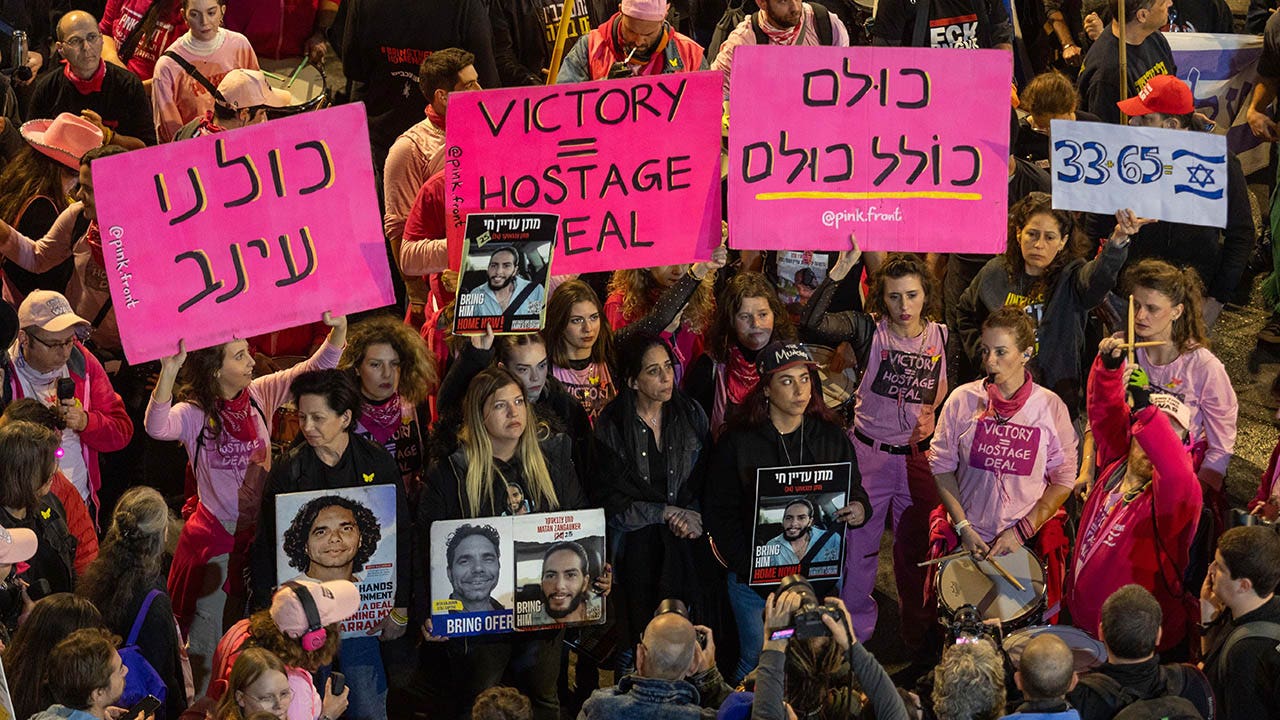
After the cease-fire agreement between Israel and Hamas goes into effect Sunday morning at 8:30 a.m. local time in Israel, which is 1:30 a.m. ET, three female hostages are the first expected to be released.
As of Saturday, at 8 p.m. ET, Israel was still waiting on the list of which hostages would be released first.
Israel’s Cabinet approved the deal early Saturday morning for a cease-fire in Gaza and the release of Israeli hostages captured after Hamas’ unprovoked attack on Israel on Oct. 7, 2023.
Phase One of the deal starts on Sunday with the release of the first three hostages and lasts 42 days.
ISRAEL DEFENSE FORCES WILL RECEIVE HOSTAGES SUNDAY WITH EQUIPPED CAMPER TRAILERS AND COMFORTING SUPPLIES
After the cease-fire agreement between Israel and Hamas goes into effect Sunday morning at 8:30 a.m. local time, which is 1:30 a.m. ET, three female hostages are the first expected to be released. (Maya Alleruzzo/Pool/AFP via Getty Images)
During that time, a total of 33 hostages will be released, with children, women, female soldiers, people over 50, and sick or injured men being prioritized. More than 1,000 Palestinian prisoners will be sent back to Gaza as well.
Most of the Israeli hostages are believed to still be alive, but their identities won’t be revealed until closer to when they’re released.
Another four hostages will be released on day seven and three more will be released on day 14, with a priority given to women.
Three more hostages will also be released on day 28 and again on day 35.
Between days 35 and 42, hostages Avera Mengistu and Hisham al-Sayed, who have both been held in Gaza since 2014 and 2015, will be released.
ISRAEL-HAMAS CEASE-FIRE: ISRAELI GOVERNMENT APPROVES DEAL SIGNED BY NEGOTIATORS
In the last week of phase one, 12 hostages will be released.
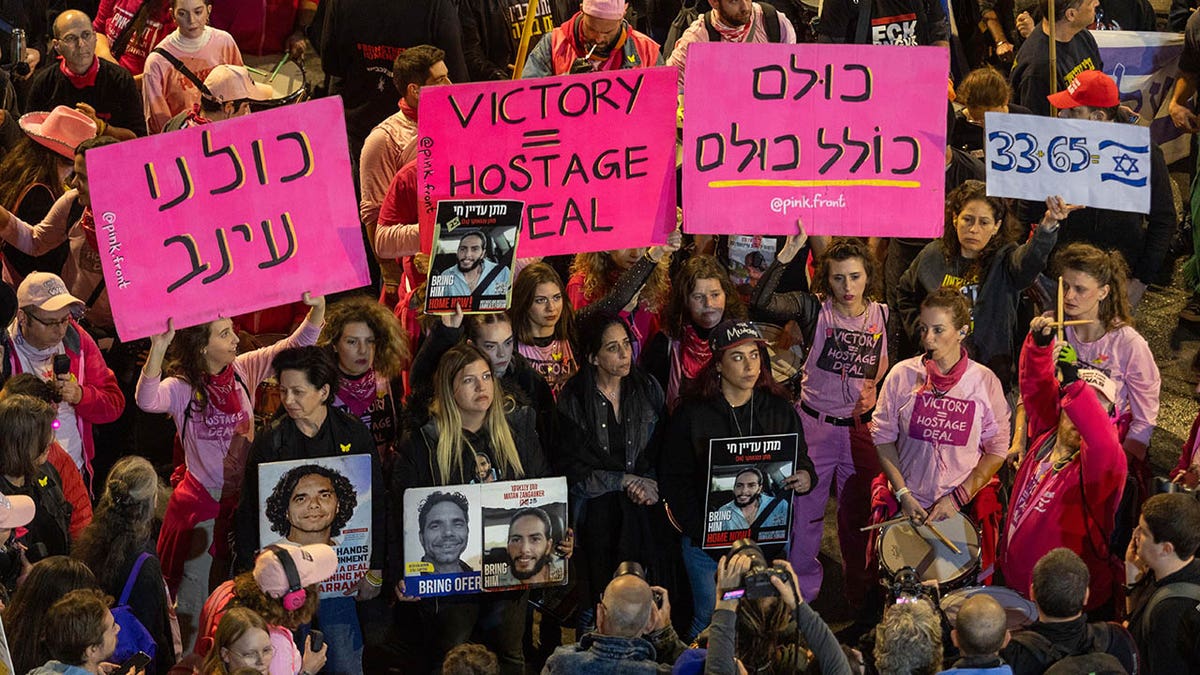
Hundreds of people gathered in Tel Aviv, Israel, on Saturday to demand the immediate return of hostages to their homes after the ceasefire came into effect. (Nir Keidar/Anadolu via Getty Images)
On the 16th day of Phase One, negotiations will begin for Phase Two, which is expected to include the release of all remaining Israeli hostages, including young men, soldiers, and fallen soldiers.
Phase Two will start on day 43 and last another 42 days.
The Israeli government decided that the Israel Defense Force will remain in Gaza until the last hostage is freed, but they will move back to a security zone along the Gaza border that provides security for residents living there.

Netanyahu and his Cabinet discuss the hostages for a cease-fire deal at the Prime Minister’s office in Jerusalem on Friday. (Courtesy: GPO)
The plan is a new defense approach and is still being finalized under the IDF’s Southern Command.
World
The EPP party says migration and the economy are its goals for 2025
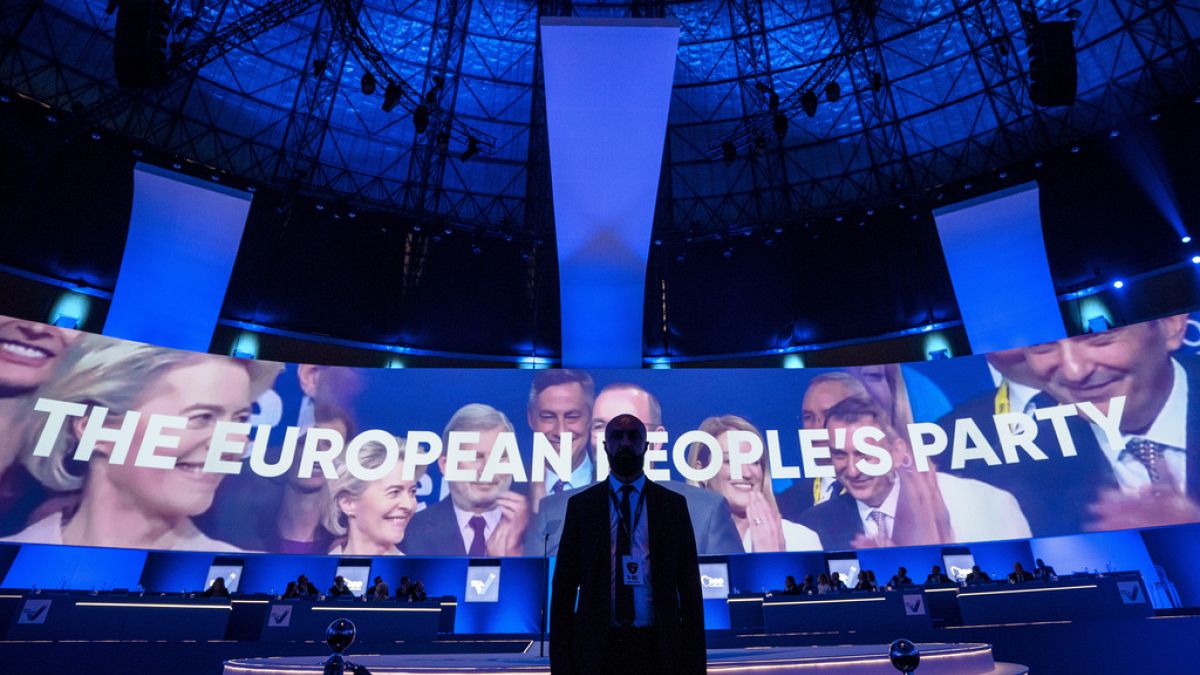
During discussions on Saturday, EPP leaders said the EU’s economy must become more competitive and both security and migration must be tackled.
The centre-right European People’s Party (EPP) met in Berlin on Saturday to outline its priorities for 2025 with leaders focussing on stopping the rise of the hard-right, promoting competitiveness, clamping down on illegal migration.
“This year, the EPP will ensure that competitiveness and securing prosperity are number one on the agenda,” the leader of Germany’s Christian Democratic Union, Friedrich Merz told his fellow EPP members.
“The second major issue is, we must now stop illegal migration, not just talk about it, but act. And the third: We must ensure that we secure peace. And we can only do that by taking a strong military stance.”
“We need tougher rules to limit irregular migration to Europe,” he added.
Merz is currently the favourite to win Germany’s federal election in February and be elected as its new chancellor.
“Lower productivity in the EU”
The EPP highlighted that European industry is getting less competitive as growth in Europe lags behind other regions. There is a growing GDP gap with the US, from 17% in 2002 to 30% in 2023.
“The main reason for the worsening situation is lower productivity in the EU, which leads to slower income growth and weaker domestic demand in Europe. Recently, international trade has come under pressure – putting additional strain on many export-oriented sectors of our economies,” the party stated.
It added that “the Russian war of aggression against Ukraine and the subsequent increase in energy prices have additionally worsened the economic outlook in Europe.”
The EPP proposes simplifying existing laws, cutting unnecessary rules, and adopting a “one in, two out” rule for new regulations.
And it’s also suggests delaying and reducing the scope of corporate sustainability laws to ease the burden on businesses.
-
/cdn.vox-cdn.com/uploads/chorus_asset/file/25822586/STK169_ZUCKERBERG_MAGA_STKS491_CVIRGINIA_A.jpg)
/cdn.vox-cdn.com/uploads/chorus_asset/file/25822586/STK169_ZUCKERBERG_MAGA_STKS491_CVIRGINIA_A.jpg) Technology1 week ago
Technology1 week agoMeta is highlighting a splintering global approach to online speech
-

 Science1 week ago
Science1 week agoMetro will offer free rides in L.A. through Sunday due to fires
-
/cdn.vox-cdn.com/uploads/chorus_asset/file/23935558/acastro_STK103__01.jpg)
/cdn.vox-cdn.com/uploads/chorus_asset/file/23935558/acastro_STK103__01.jpg) Technology1 week ago
Technology1 week agoAmazon Prime will shut down its clothing try-on program
-

 News1 week ago
News1 week agoMapping the Damage From the Palisades Fire
-
/cdn.vox-cdn.com/uploads/chorus_asset/file/25826211/lorealcellbioprint.jpg)
/cdn.vox-cdn.com/uploads/chorus_asset/file/25826211/lorealcellbioprint.jpg) Technology7 days ago
Technology7 days agoL’Oréal’s new skincare gadget told me I should try retinol
-
/cdn.vox-cdn.com/uploads/chorus_asset/file/25832751/2192581677.jpg)
/cdn.vox-cdn.com/uploads/chorus_asset/file/25832751/2192581677.jpg) Technology3 days ago
Technology3 days agoSuper Bowl LIX will stream for free on Tubi
-

 Business5 days ago
Business5 days agoWhy TikTok Users Are Downloading ‘Red Note,’ the Chinese App
-
/cdn.vox-cdn.com/uploads/chorus_asset/file/25835602/Switch_DonkeyKongCountryReturnsHD_scrn_19.png)
/cdn.vox-cdn.com/uploads/chorus_asset/file/25835602/Switch_DonkeyKongCountryReturnsHD_scrn_19.png) Technology2 days ago
Technology2 days agoNintendo omits original Donkey Kong Country Returns team from the remaster’s credits

